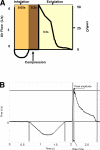Expiratory muscle strength training in persons with multiple sclerosis having mild to moderate disability: effect on maximal expiratory pressure, pulmonary function, and maximal voluntary cough
- PMID: 16571384
- PMCID: PMC3121162
- DOI: 10.1016/j.apmr.2005.12.035
Expiratory muscle strength training in persons with multiple sclerosis having mild to moderate disability: effect on maximal expiratory pressure, pulmonary function, and maximal voluntary cough
Abstract
Objective: To determine the effect of expiratory muscle strength training (EMST) on maximal expiratory strength, pulmonary function, and maximal voluntary cough in persons with multiple sclerosis (MS) having mild to moderate disability.
Design: Before-after trial.
Setting: Assessments were completed in the privacy of the subject's home or exercise physiology laboratory.
Participants: Seventeen persons with MS were age- and sex-matched to 14 healthy controls.
Intervention: Eight weeks of EMST and 4 weeks of detraining.
Main outcome measures: Maximal respiratory pressures, pulmonary function, and maximal voluntary cough were assessed 3 times (pretraining, posttraining, detraining). Maximal expiratory pressure (MEP) was assessed weekly and training intensity adjusted based on the new measurement.
Results: Subjects with MS had lower MEP, decreased pulmonary function, and weaker maximal voluntary cough at each assessment. EMST increased MEP and peak expiratory flow. However, improvement in maximal voluntary cough only occurred in subjects with a moderate level of disability when the MS group was subdivided into mild and moderate disability levels based on the Expanded Disability Status Scale.
Conclusions: EMST is a viable tool to enhance the strength of the respiratory muscles. However, further work is needed to determine the best parameters to assess change in cough following EMST.
Figures



Similar articles
-
Severely disabled multiple sclerosis patients can achieve the performance of healthy subjects after expiratory muscle strength training.Mult Scler Relat Disord. 2021 Oct;55:103187. doi: 10.1016/j.msard.2021.103187. Epub 2021 Aug 5. Mult Scler Relat Disord. 2021. PMID: 34388534
-
A combined inspiratory and expiratory muscle training program improves respiratory muscle strength and fatigue in multiple sclerosis.Arch Phys Med Rehabil. 2013 Oct;94(10):1964-70. doi: 10.1016/j.apmr.2013.05.005. Epub 2013 May 25. Arch Phys Med Rehabil. 2013. PMID: 23714277 Clinical Trial.
-
Expiratory training in multiple sclerosis.Arch Phys Med Rehabil. 1996 Sep;77(9):909-12. doi: 10.1016/s0003-9993(96)90281-6. Arch Phys Med Rehabil. 1996. PMID: 8822685 Clinical Trial.
-
Effectiveness of expiratory muscle strength training on expiratory strength, pulmonary function and cough in the adult population: a systematic review.Physiotherapy. 2020 Mar;106:43-51. doi: 10.1016/j.physio.2019.06.002. Epub 2019 Jun 13. Physiotherapy. 2020. PMID: 32026845
-
Effect of Expiratory Muscle Strength Training on Swallowing and Cough Functions in Patients With Neurological Diseases: A Meta-analysis.Am J Phys Med Rehabil. 2019 Dec;98(12):1060-1066. doi: 10.1097/PHM.0000000000001242. Am J Phys Med Rehabil. 2019. PMID: 31180929 Review.
Cited by
-
Aspiration and swallowing in Parkinson disease and rehabilitation with EMST: a randomized trial.Neurology. 2010 Nov 23;75(21):1912-9. doi: 10.1212/WNL.0b013e3181fef115. Neurology. 2010. PMID: 21098406 Free PMC article. Clinical Trial.
-
Respiratory muscle training for multiple sclerosis.Cochrane Database Syst Rev. 2017 Dec 21;12(12):CD009424. doi: 10.1002/14651858.CD009424.pub2. Cochrane Database Syst Rev. 2017. PMID: 29267988 Free PMC article.
-
A Systematic Review of Rehabilitation for Corticobulbar Symptoms in Adults with Huntington's Disease.J Huntingtons Dis. 2020;9(1):1-12. doi: 10.3233/JHD-190384. J Huntingtons Dis. 2020. PMID: 31744013 Free PMC article.
-
The role of non-invasive ventilation and factors predicting extubation outcome in myasthenic crisis.Neurocrit Care. 2009;10(1):35-42. doi: 10.1007/s12028-008-9139-y. Epub 2008 Sep 20. Neurocrit Care. 2009. PMID: 18810663
-
Effects of home-based respiratory muscle training in children and adolescents with chronic lung disease.J Bras Pneumol. 2014 Nov-Dec;40(6):626-33. doi: 10.1590/S1806-37132014000600006. J Bras Pneumol. 2014. PMID: 25610503 Free PMC article.
References
-
- Balbierz J, Ellenberg M, Honet J. Complete hemidiaphragmatic paralysis in a patient with multiple sclerosis. Am J Phys Med Rehabil. 1988;67:161–5. - PubMed
-
- Carter J, Noseworthy J. Ventilatory dysfunction in multiple sclerosis. Clin Chest Med. 1994;15:693–703. - PubMed
-
- Gosselink R, Kovacs L, Ketelaer P, Carton H, Decramer M. Respiratory muscle weakness and respiratory muscle training in severely disabled multiple sclerosis patients. Arch Phys Med Rehabil. 2000;81:747–51. - PubMed
-
- Howard R, Wiles C, Hirsch N, Loh L, Spencer G, Newsome-Davis J. Respiratory involvement in multiple sclerosis. Brain. 1992;115:479–94. - PubMed
-
- Klefbeck B, Nedjad J. Effect of inspiratory muscle training in patients with multiple sclerosis. Arch Phys Med Rehabil. 2003;84:994–9. - PubMed
Publication types
MeSH terms
Grants and funding
LinkOut - more resources
Full Text Sources
Other Literature Sources
Medical

